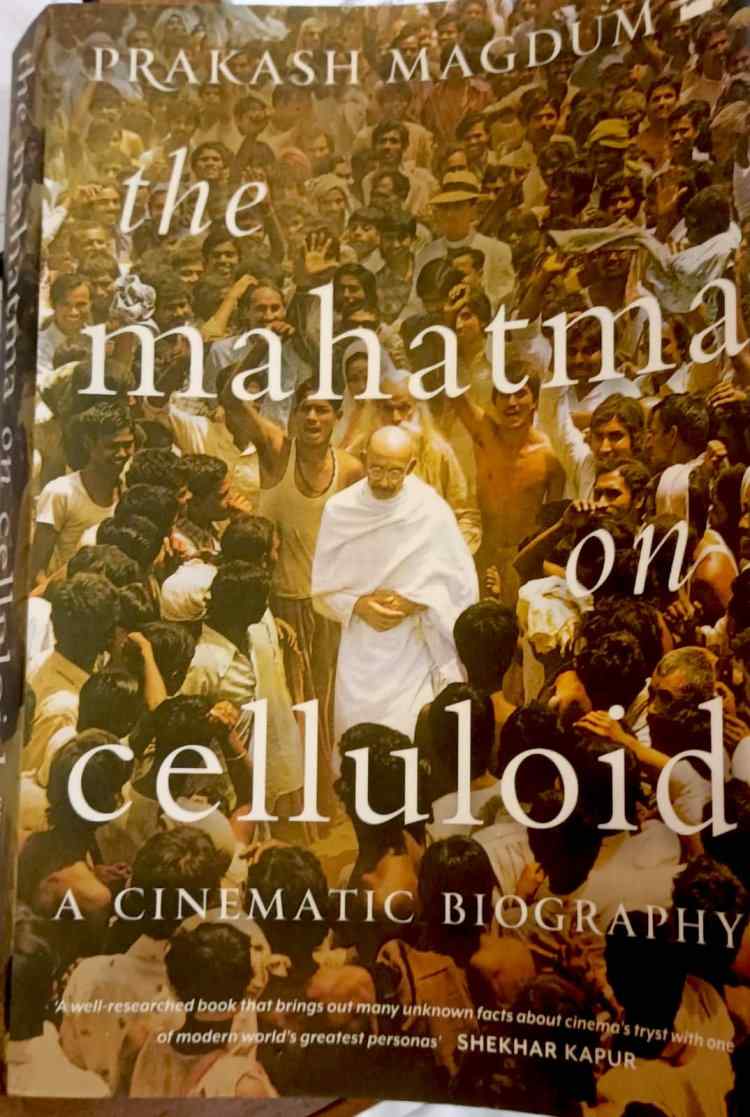Prakash Magdum's book "The Mahatma on Celluloid: A Cinematic Biography": An in-depth exploration of the cinematic legacy of Mahatma Gandhi
In this critique, Parthajit Baruah , editor of North East Film Journal, provides an evaluation of Prakash Magdum's "The Mahatma on Celluloid: A Cinematic Biography."

Prakash Magdum, a former director of the National Film Archive of India (NFAI), has written the new book "The Mahatma on Celluloid: A Cinematic Biography." in 2022. The book comprises a total of eighteen chapters and features a Foreword by Shyam Benegal. The book, published by HarperCollins, has a total of 356 pages. In the Foreword, Shyam Benegal states that "Prakash Magdum is a noted film archivist and was the director of NFAI in Pune. He is clearly very passionate about his vacation. Over a period of time, he has made a detailed inventory of the films made on and about Mahatma Gandhi." The chapter titles, such as "Raghupati Raghav Rajaram," "It's Not Vidur; It's Gandhiji!", "The Mystery Man in London," and "Hollywood Loves Gandhi," give readers an idea of the breadth of the book's subject matter. This book provides a thorough examination of the entirety of cinematic productions featuring Mahatma Gandhi, spanning from the era of silent films to contemporary times.

Image: Prakash Magdum
Prakash Magdum's "The Mahatma on Celluloid: A Cinematic Biography" is a meticulously crafted work that provides an in-depth exploration of the cinematic legacy of Mahatma Gandhi. Magdum provides a comprehensive analysis of the development of cinema as an artistic medium and its influence on the portrayal of India's most renowned leader- Gandhi, taking the reader on a historical excursion.
The introductory section of the book highlights the significance of cinema as a tool for disseminating Gandhi's ideology and promoting his principles of non-violence and liberation. The author elucidates the diverse cinematic methodologies employed by filmmakers throughout history to portray Gandhi on film.
Magdum's proficiency in the realm of cinema and history is conspicuous as he guides the reader through a chronological expedition, delving into the progression of cinema as a medium of artistic expression and its influence on the portrayal of Gandhi. The author presents a comprehensive examination of every movie and its relevance in terms of history and culture. The author additionally examines the recurring themes and motifs present in the majority of films centred around Gandhi, including the prioritisation of his austere lifestyle, his philosophy of non-violence, and his aptitude for bringing together individuals from varying societal backgrounds.
Magdum does an excellent job of contextualising the films within the broader historical, political, and social milieu of the times they were made. He highlights the impact of British colonialism, the Indian freedom struggle, and the cultural renaissance on the representation of Gandhi in cinema. The author also discusses the challenges faced by filmmakers in representing Gandhi, especially in an era of censorship and political turmoil.
One of the most interesting aspects of the book is its exploration of the representation of Gandhi in non-Indian cinema. Magdum examines how Gandhi was portrayed in Hollywood films like Richard Attenborough's acclaimed biopic 'Gandhi', which won eight Academy Awards. He also looks at the representation of Gandhi in other countries where he was considered a cultural icon.
Magdum's writing is engaging and informative, and the book is well-researched and comprehensive. He provides extensive references and sources, making it an invaluable resource for scholars, historians, and cinephiles interested in the representation of Gandhi.
In conclusion, "The Mahatma on Celluloid: A Cinematic Biography" is an important contribution to the fields of cinema and history. Prakash Magdum's meticulous research and analysis provide a comprehensive overview of the representation of Gandhi in cinema, and the book is a valuable resource for anyone interested in the subject. Although it may be too academic for some readers, it remains a well-written and insightful book that sheds new light on the relationship between cinema and history.
***
What's Your Reaction?






























































